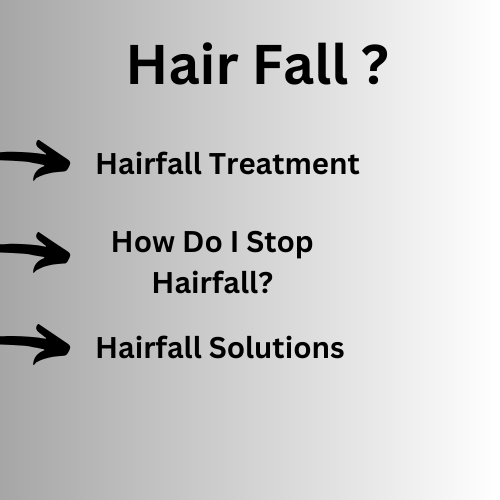Are you losing more hair than you’d like? Hairfall is a common concern for people of all ages and genders. Fortunately, there are multiple approaches to tackle this problem. In this comprehensive guide, we will explore the causes of hairfall, effective treatments, and solutions to help you combat this problem and achieve healthier, fuller hair.

Hairfall Treatment: Understanding the Root Causes
Before delving into the treatments and solutions, it’s essential to understand the underlying causes of hairfall. The following are typical factors that can contribute to hair loss:
1. Genetics: One of the most significant factors influencing hairfall is genetics. If hair loss runs in your family, there is a likelihood that you have a genetic predisposition to it.
2. Diet and Nutrition: A diet lacking essential nutrients, such as iron, biotin, and protein, can weaken hair and contribute to hairfall.
3. Stress: Chronic stress can disrupt the hair growth cycle, leading to increased hairfall.
4. Medical Conditions: Certain medical conditions like thyroid disorders and autoimmune diseases can cause hairfall.

How Do I Stop Hairfall?
Now that you have a better understanding of what might be causing your hairfall, it’s time to explore effective ways to stop it. Here are a variety of strategies you can investigate:
1. Nutrient-Rich Diet
Ensure your diet is rich in hair-friendly nutrients like biotin, iron, and protein. Incorporate foods like eggs, leafy greens, nuts, and lean meats to promote healthy hair growth.
2. Proper Hair Care
Use a mild, sulfate-free shampoo and conditioner. Minimize the use of high-heat styling tools and avoid tight hairstyles, as they can be detrimental to your hair’s health. Be gentle when brushing and avoid vigorous towel-drying.
3. Stress Management
Practice stress-reduction techniques such as yoga, meditation, or mindfulness to minimize the impact of stress on your hair.
4. Consult a Healthcare Professional
If you suspect an underlying medical condition, consult a healthcare professional for a proper diagnosis and treatment plan. They may recommend medications or therapies to address the issue.
5. Haircare Products
Choose haircare products that are specifically formulated to combat hairfall. Look for ingredients like minoxidil, caffeine, and ketoconazole, which have shown effectiveness in reducing hairfall.
Hairfall Solution: Practical Steps for Fuller Hair
In addition to the treatments mentioned above, here are some practical solutions to help you achieve healthier, fuller hair:
1. Scalp Massage
Frequent scalp massages can enhance blood circulation to the hair follicles, thereby stimulating hair growth. For added benefits, you can incorporate essential oils such as lavender or rosemary into your routine.
2. Lifestyle Changes
Lead a healthy lifestyle by exercising regularly and getting adequate sleep. These habits contribute to overall well-being, which can positively impact hair health.
3. Hair Supplements
Consider taking hair supplements that contain essential vitamins and minerals to support hair growth. It’s crucial to seek guidance from a healthcare professional before introducing any new supplements into your routine.
4. Haircare Routine
Establish a consistent haircare routine that includes gentle cleansing, conditioning, and moisturizing. Avoid harsh treatments and products that can damage your hair.
5. Hair Transplants
For those with severe hair loss, hair transplantation is a long-term solution. Consult with a dermatologist or hair specialist to discuss this option.
Conclusion
In conclusion, hairfall is a common concern, but it doesn’t have to be a permanent issue. By understanding the causes and implementing the right treatments and solutions, you can take significant steps to stop hairfall and achieve the lush, healthy hair you desire. Remember, results may vary, and it’s essential to be patient as you work towards your hair health goals. If you’re unsure about the best approach for your specific situation, consult a healthcare professional or dermatologist for personalized guidance.
